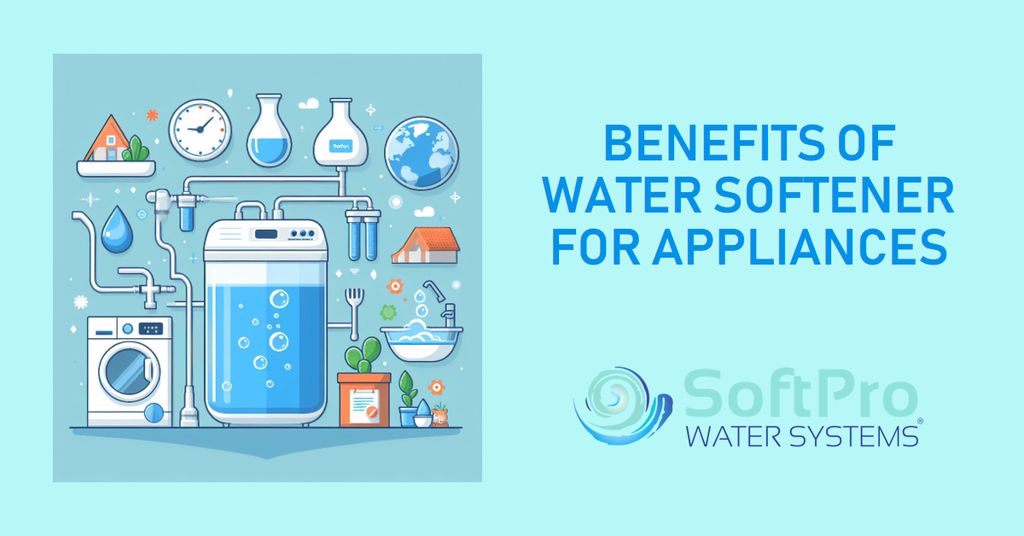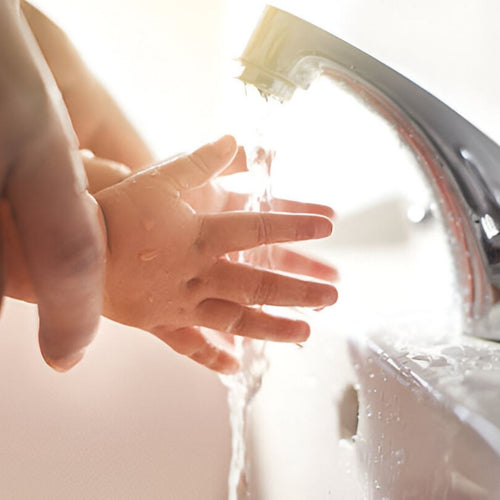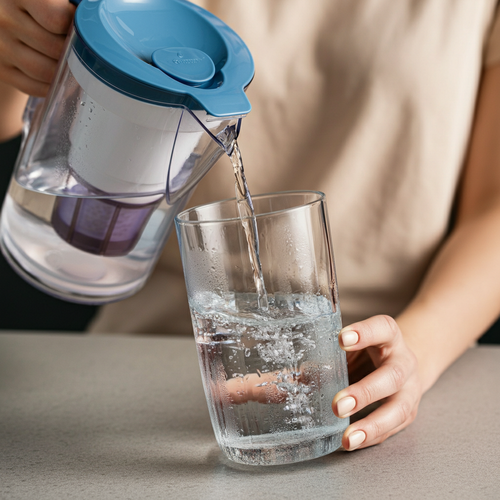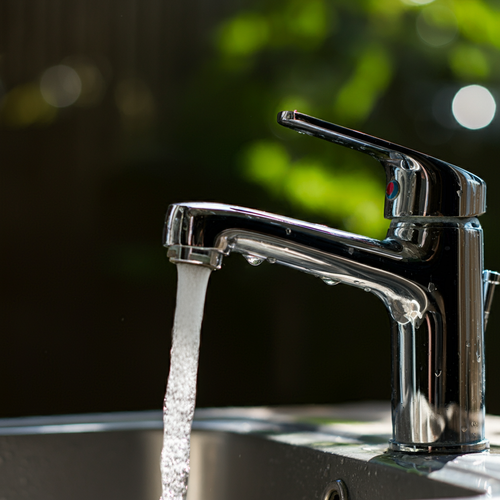Living in a hard water zone can be rough on your appliances. The culprit? Mineral buildup, primarily calcium and magnesium, lurking in your water supply. These minerals, while harmless to humans, wreak havoc on your dishwashers, washing machines, water heaters, and more. From reduced efficiency and performance to shortened lifespans and increased maintenance costs, hard water takes a toll on your beloved appliances. But fear not, for there's a hero in the wings: the mighty water softener.
This trusty device acts as a shield, intercepting the mineral invaders before they can infiltrate your appliances. Through a process called ion exchange, water softeners swap out those troublesome minerals for harmless alternatives like sodium or potassium. The result? Softer, cleaner water that keeps your appliances happy and healthy.
So, if you're experiencing cloudy glasses, dingy clothes, lukewarm showers, or frequent appliance repairs, chances are hard water is the villain. But before you resign yourself to a life of subpar appliance performance, let's delve deeper into the specific benefits water softeners offer your hardworking household heroes.
Dishwashers
Hard water throws a wrench in the dishwashing game. Mineral buildup clings to dishes, leaving behind a filmy residue and hindering detergent effectiveness. This means cloudy glasses, spotty silverware, and dishes that just don't feel clean. But with a water softener in your corner, dishwashing transforms into a sparkling success story.
Enhanced Cleaning Power
Softer water allows detergents to lather more effectively, boosting their cleaning power. This translates to sparkling dishes, even with reduced detergent use, saving you money and protecting the environment. A study by the Water Quality & Technology Council found that homes with softened water used 50% less detergent on average, showcasing the significant cleaning boost.
Banishing Mineral Deposits
Hard water minerals like calcium and magnesium leave behind limescale deposits that dull dishwashers and reduce their efficiency. Water softeners prevent these deposits from forming, keeping your dishwasher's interior sparkling and its performance optimal. According to the International Water Softener Association, softened water can extend the lifespan of dishwashers by up to 30%, saving you money on repairs and replacements.
Spotless Finishes
Say goodbye to water spots and streaks on your glasses and silverware! Softer water leaves dishes rinsed clean, eliminating the mineral residue that causes those unsightly marks. This not only enhances the visual appeal of your dishes but also prolongs the lifespan of delicate glassware and silverware.
Beyond the Dishes
The benefits of softened water extend beyond sparkling dishes. Water softeners also improve the efficiency of dishwashers by reducing energy consumption. The Water Quality & Technology Council study found that homes with softened water used 28% less energy for dishwashing, contributing to both cost savings and environmental sustainability.
Washing Machines
Hard water throws a curveball at your laundry routine. Mineral buildup dulls fabrics, stiffens clothes, and fades colors, leaving you with lackluster laundry. But fear not, for water softeners step up to the plate, transforming laundry days into a celebration of vibrant, soft, and clean clothes.
Enhanced Cleaning Performance
Softer water allows detergents to work more effectively, penetrating fabrics and removing dirt and stains with greater ease. This means cleaner clothes, even on gentler wash cycles, reducing the need for harsh detergents and hot water, which can damage fabrics. A study by the Water Quality & Technology Council found that homes with softened water used 68% less laundry detergent on average, highlighting the significant cleaning boost.
Banishing Mineral Deposits
Hard water minerals like calcium and magnesium can build up in washing machines, reducing their efficiency and impacting their lifespan. Water softeners prevent these deposits, keeping your washing machine running smoothly and efficiently. According to the International Water Softener Association, softened water can extend the lifespan of washing machines by up to 25%, saving you money on repairs and replacements.
Softer Fabrics, Happier Clothes
Hard water leaves clothes feeling stiff and rough. Softer water, however, allows fabrics to retain their natural softness and elasticity. This not only enhances the comfort of your clothes but also extends their lifespan by reducing wear and tear. A study by the Textile Research Journal found that clothes washed in softened water exhibited 20% less wear and tear compared to those washed in hard water.
Vibrant Colors, Lasting Freshness
Hard water can cause colors to fade and bleed, making your clothes look dull and worn. Softer water, on the other hand, preserves the vibrancy of colors and prevents dye transfer. This means your clothes retain their original colors for longer, looking fresh and vibrant wash after wash.
Beyond the Clothes
The benefits of softened water extend beyond softer, cleaner clothes. Water softeners also improve the efficiency of washing machines by reducing energy consumption. The Water Quality & Technology Council study found that homes with softened water used 22% less energy for laundry, contributing to both cost savings and environmental sustainability.
Water Heaters
Your water heater, the tireless champion of hot showers and cozy baths, can also fall victim to the villainous clutches of hard water. Mineral buildup forms within the heating elements, reducing efficiency and leading to higher energy bills. But fear not, for water softeners come to the rescue, ensuring your water heater delivers consistent, efficient hot water, keeping your comfort and budget happily ever after.
Boosting Efficiency
Hard water deposits act like an insulating blanket around the heating elements, forcing them to work harder to reach desired temperatures. Water softeners remove these deposits, allowing the elements to heat water more efficiently. This translates to lower energy consumption, potentially reducing your water heating costs by up to 22%, as reported by the Water Quality & Technology Council.
Extending Lifespan
Mineral buildup can damage heating elements, leading to premature failure and costly replacements. Water softeners prevent this by keeping the elements clean and free of scale, extending the lifespan of your water heater by up to 25%, according to the International Water Softener Association. This translates to significant savings on repair and replacement costs.
Faster Hot Water Delivery
Mineral deposits can restrict water flow within the water heater, leading to delayed hot water delivery. Water softeners eliminate these restrictions, allowing water to flow freely, ensuring you get that satisfying hot shower without the frustrating wait.
Beyond the Heat
Softer water benefits your plumbing system as well. By preventing scale buildup in pipes and fixtures, water softeners reduce the risk of leaks and clogs, minimizing maintenance needs and associated costs. Additionally, softer water contributes to smoother operation of other water-using appliances like dishwashers and washing machines, further enhancing their performance and lifespan.
Beyond Appliances
The benefits of a water softener extend far beyond gleaming appliances and pristine laundry. Softer water positively impacts your entire household, your well-being, and even the environment. Let's explore these broader advantages:
Enhanced Cleaning Efficiency
Say goodbye to excessive scrubbing and harsh chemicals! Softer water allows soap and detergents to lather more effectively, meaning less product is needed for the same cleaning power. This applies to everything from dishwashing and laundry to bathroom and kitchen surfaces. A study by the American Cleaning Institute found that homes with softened water used 58% less cleaning products on average, demonstrating significant cost savings and environmental benefits.
Softer Skin and Hair
Hard water can be harsh on your skin and hair, leaving them feeling dry and irritated. Softer water, on the other hand, is gentler on the skin, promoting its natural moisture balance and reducing irritation. Additionally, it leaves hair feeling softer and more manageable. A study published in the International Journal of Trichology found that individuals using softened water reported improvements in hair texture, manageability, and shine compared to those using hard water.
Reduced Water Usage
Contrary to popular belief, water softeners can actually help conserve water. Due to their enhanced cleaning efficiency, less water is required for tasks like dishwashing and laundry. Additionally, by preventing mineral buildup in pipes and fixtures, water softeners minimize leaks and drips, further reducing water waste. The Water Quality & Technology Council estimates that homes with softened water can save up to 26% on their total water usage.
Environmental Impact
The benefits of water conservation extend to the environment. By reducing water usage and the need for harsh chemicals, water softeners contribute to a more sustainable household. Additionally, by prolonging the lifespan of appliances and minimizing repairs, water softeners reduce the environmental impact associated with manufacturing and waste disposal.
Choosing the Right Water Softener: Navigating the Options
With the benefits of softened water firmly established, it's time to embark on the quest for the perfect water softener for your home. But amidst the array of options, navigating the choices can feel daunting. Fear not, for this guide will equip you with the knowledge to confidently select the ideal softener suited to your specific needs and water conditions.
Types of Water Softeners
- Salt-based softeners: The most common type, utilizing salt (sodium chloride) to exchange hard water minerals with sodium ions. They are effective and widely available, but require regular salt refilling and maintenance.
- Salt-free softeners: Employ alternative technologies like template resin or chelation to inhibit scale formation without using salt. They require minimal maintenance but may be less effective in areas with extremely hard water.
- Combination softeners: Combine elements of both salt-based and salt-free systems, offering flexibility and potentially addressing a wider range of water hardness levels.
Factors to Consider
- Water hardness: Determine your water hardness level through a home test kit or contacting your local water authority. This will guide the type and capacity of softener needed.
- Water usage: Choose a softener with sufficient capacity to handle your average daily water consumption. Consider factors like household size and appliance usage.
- Budget: Salt-based softeners are generally more affordable upfront, while salt-free and combination options may have higher initial costs but lower long-term maintenance expenses.
- Installation and maintenance: Assess your DIY skills or consider professional installation. Salt-based softeners require regular salt refilling and periodic regeneration cycles.
- Environmental impact: Salt-based softeners can impact local ecosystems through brine discharge. Consider salt-free options or responsible brine disposal methods.
Conclusion: Unleashing the Power of Soft Water for Your Home
The benefits of a water softener extend far beyond sparkling dishes and pristine laundry. By combating the detrimental effects of hard water, these remarkable systems safeguard your appliances, enhance your well-being, and even contribute to environmental sustainability.
Key Takeaways
- Appliance Longevity: Water softeners prevent mineral buildup, extending the lifespan of dishwashers, washing machines, water heaters, and more, potentially saving you thousands in repairs and replacements. Studies by the International Water Softener Association and the Water Quality & Technology Council report lifespan increases of up to 30% for dishwashers, 25% for washing machines, and 25% for water heaters.
- Enhanced Cleaning Performance: Softer water allows detergents and soaps to work more effectively, leading to cleaner dishes, brighter laundry, and reduced cleaning product usage. Homes with softened water use an average of 50% less detergent for dishwashing, 68% less for laundry, and 58% less for general cleaning, as per studies by the Water Quality & Technology Council and the American Cleaning Institute.
- Improved Efficiency and Cost Savings: Water softeners reduce energy consumption in appliances and minimize water waste through leak prevention. The Water Quality & Technology Council reports potential energy savings of 28% for dishwashing, 22% for laundry, and 22% for water heating.
- Healthier Home Environment: Softer water benefits your skin and hair, reduces the need for harsh chemicals, and minimizes scaling in pipes and fixtures, contributing to a healthier and more sustainable household. A study published in the International Journal of Trichology found improvements in hair texture and manageability with softened water, while the Water Quality & Technology Council estimates a 26% reduction in total water usage.
Investing in a water softener is an investment in the well-being of your home, your family, and the environment. By carefully considering your water hardness, usage needs, and budget, you can select the ideal system to unlock the transformative power of soft water.
Consulting a qualified water treatment professional can ensure you choose and install the perfect water softener for your unique circumstances. With proper care and maintenance, your softener will provide years of reliable service, transforming your home into a haven of sparkling appliances, clean laundry, and a healthier, more sustainable living environment.


















![Aldex Premium 10% Cross Link Resin for Water Softener [High Capacity]-SoftPro® Water Systems](http://www.softprowatersystems.com/cdn/shop/files/Aldex_10_Cross_Link_Resin_Premium_High_Capacity_for_Water_Softener_600x.jpg?v=1735853599)






















